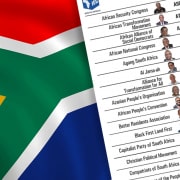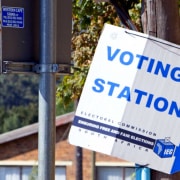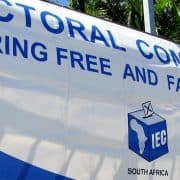|
Getting your Trinity Audio player ready...
|
Act 6 of 2018, otherwise known as the Political Party Funding Act (PPFA), has been signed into law by President Cyril Ramaphosa. The act was gazetted on 23 January. It represents a significant step forward for democracy and accountability in the murky world of political party funding and opens up such funding to public and official scrutiny, as parties will be obliged to disclose their private sources of funding.
The Presidency has yet to issue a statement on the signing, but this is because of logistical issues, according to Presidency spokesperson Khusela Diko. Ramaphosa is currently in Davos, Switzerland, for the annual meeting of the World Economic Forum.
The president also needs to consult with the Independent Electoral Commission (IEC) and the National Treasury before announcing a date for enactment, said Diko. “It imposes certain obligations on them and we must gauge their state of readiness.”
Corruption Watch (CW) contributed to the final form of the act, appearing twice before the parliamentary ad-hoc committee tasked with overseeing the process, to make both written and oral submissions. In October 2017 we made a written submission on the bill, expressing concerns mainly around the continued lack of transparency in the private finding of parties. Then on 20 June 2018 we made an oral submission before the committee, this time focusing on the definition of foreign persons, which has a bearing on the issue of beneficial ownership, as well as the non-regulation of funding from companies that do business with the state and funding from investment vehicles owned by political parties.
At the time we expressed a hope that the PPFA would be enforced before this year’s general elections. This is not likely to happen, said Diko, as the PPFA would probably be implemented in stages, so as to not overload the fiscus. “Those provisions that will not put too great a burden on the fiscus right now will be prioritised.”
“The act is a good start to regulate party political funding,” commented CW’s executive director David Lewis. “The concerning thing is that it will not be ready in time, even though it’s signed into law, to impact on the next set of elections. There are regulations that need to be put in place, even institutions that need to be established. But it’s an absolutely essential way to go. It’s a no-brainer.”
One aspect of the PPFA that Lewis particularly liked, he said, was the establishment of the Multi-Party Democracy Fund, where private sources, and businesses in particular, can contribute to a fund that is then allocated to political parties according to a formula, rather than directly funding any one party. “So they don’t support a particular party.”
The fund, as well as the Represented Political Party Fund which is also established under the PPFA, will be administered by the IEC.
In a statement, the Right2Know Campaign also welcomed the signing of the PPFA. “This is a long-overdue step towards a more transparent and accountable democracy, in which voters have basic information about who funds our political parties.”
The organisation did express disappointment that it took Ramaphosa a further five months to sign the bill, after it and My Vote Counts called on him to attend urgently to the matter. “The delay ensures that the law’s transparency clauses will not be implemented before the 2019 national elections. Once again, political parties will be able to receive millions of rands from secret sources to campaign for our votes, without having to account for one cent.”
Cutting down on undue influence
The upper limit of donations in terms of the PPFA is R15-million within a financial year, while the disclosure limit is R100 000 within a financial year. All donations above this threshold must be disclosed to the IEC, while a juristic person or entity that makes a donation above that threshold must also disclose that donation to the IEC.
The act prohibits any foreign governments and foreign government agencies from funding South African parties, neither may parties accept donations from domestic organs of state or state-owned enterprises. The act also states that “No person or entity may deliver a donation to a member of a political party other than for party political purposes.”
This eliminates the ever-present problem of undue influence through bribery. It would also control the influence of individuals backing certain party factions, said Diko, a problem that is present “across the board”.
In his book The President’s Keepers, investigative journalist Jacques Pauw alleged that in 2014 the EFF received funds from a known criminal, self-confessed tobacco smuggler Adriano Mazzoti, which allowed them to register the party and contest elections for the first time.
Hitachi Power Africa secured a R20-billion contract to supply six boilers for Medupi Power Station in 2007. The US Securities and Exchange Commission later charged Hitachi with violating the Foreign Corrupt Practices Act by “inaccurately recording improper payment” made to the ANC’s investment arm – or funding front, as some refer to it – Chancellor House Holdings. Hitachi was alleged to have paid $1 million in “success fees” to Chancellor House in 2008, and improperly recorded it as consulting fees.
The Gupta family, Uruguayan businessman Gaston Savoi, French multinational arms company Thales – implicated in the arms deal controversy – and others are known to have contributed to political party bank accounts. The revelations coming from the Zondo Commission into state capture, not only over the past 10 days in the testimony of former Bosasa COO Angelo Agrizzi, but over the entire duration of the public hearings so far, have shown that undue influence can be bought – but disclosure and transparency will go a long way towards negating such influence.
The IEC, which will monitor compliance with the PPFA, will be able to impose sanctions on entities that violate the act. The PPFA gives the IEC the power to suspend payment of money, to take steps to recover money irregularly accepted or spent, and, through the Electoral Court, to impose a fine. It also sets out the schedule of maximum fines that may be imposed on new or repeat offenders.
The IEC may also issue a direction to a political party in order to avoid imposing a sanction, after giving that party an opportunity to make representations.
About the PPFA
The aim of the PPFA is “To provide for, and regulate, the public and private funding of political parties, in particular;
- the establishment and management of Funds to fund represented political parties sufficiently;
- to prohibit certain donations made directly to political parties;
- to regulate disclosure of donations accepted;
- to determine the duties of political parties in respect of funding;
- to provide for powers and duties of the Commission;
- to provide for administrative fines;
- to create offences and penalties;
- to repeal the Public Funding of Represented Political Parties Act, 1997; and
- to provide for transitional matters; and to provide for related matters.
Download the PPFA.
The Political Party Funding Bill went through the prescribed parliamentary process in what seemed like record time. CW’s Lewis commented that it was extremely shocking that Vincent Smith, the chairperson of the parliamentary ad hoc committee, was implicated in Bosasa bribery after his sterling service in steering the bill through the various required stages,
From 21 June 2017, when Smith was elected as chairperson, to 28 June 2018 when the bill was passed by both houses and sent to Ramaphosa for signing, the process took little more than 12 months.
• Image: Flickr/governmentza








